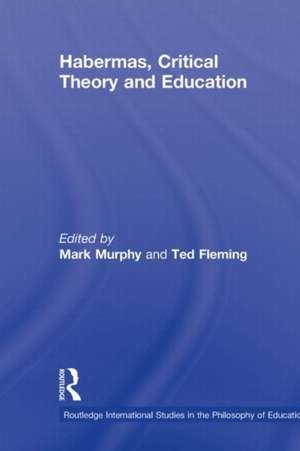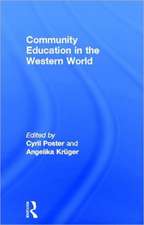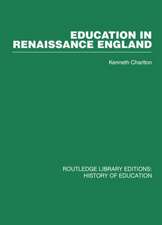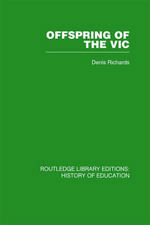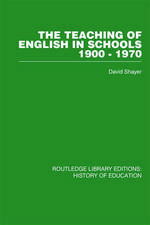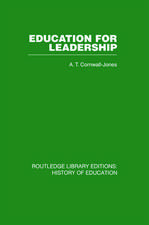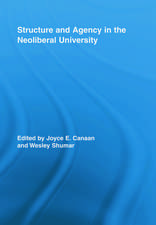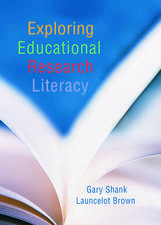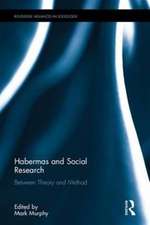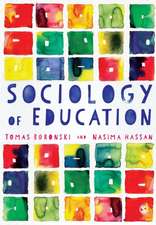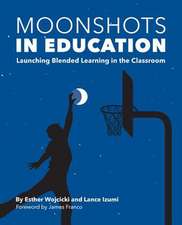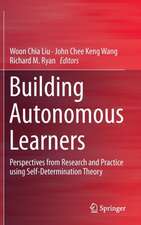Habermas, Critical Theory and Education: Routledge International Studies in the Philosophy of Education
Editat de Mark Murphy, Ted Flemingen Limba Engleză Paperback – 21 feb 2012
Additionally, the book answers a range of more specific questions, including: what are the implications for pedagogy of a shift from a philosophy of consciousness to a philosophy of language?; What contribution can Habermas's re-shaping of speech act theory and communicative rationality make to theories of classroom interaction?; and how can his theories of reason and colonization be used to explore questions of governance and accountability in education?
| Toate formatele și edițiile | Preț | Express |
|---|---|---|
| Paperback (1) | 401.39 lei 3-5 săpt. | +21.01 lei 6-10 zile |
| Taylor & Francis – 21 feb 2012 | 401.39 lei 3-5 săpt. | +21.01 lei 6-10 zile |
| Hardback (1) | 1110.81 lei 6-8 săpt. | |
| Taylor & Francis – 26 oct 2009 | 1110.81 lei 6-8 săpt. |
Din seria Routledge International Studies in the Philosophy of Education
- 9%
 Preț: 934.94 lei
Preț: 934.94 lei -
 Preț: 302.20 lei
Preț: 302.20 lei -
 Preț: 303.87 lei
Preț: 303.87 lei -
 Preț: 272.12 lei
Preț: 272.12 lei -
 Preț: 303.87 lei
Preț: 303.87 lei -
 Preț: 478.51 lei
Preț: 478.51 lei -
 Preț: 321.15 lei
Preț: 321.15 lei - 18%
 Preț: 1214.92 lei
Preț: 1214.92 lei - 18%
 Preț: 1175.72 lei
Preț: 1175.72 lei - 13%
 Preț: 350.29 lei
Preț: 350.29 lei - 18%
 Preț: 701.69 lei
Preț: 701.69 lei - 18%
 Preț: 1000.27 lei
Preț: 1000.27 lei -
 Preț: 476.60 lei
Preț: 476.60 lei -
 Preț: 483.50 lei
Preț: 483.50 lei -
 Preț: 248.44 lei
Preț: 248.44 lei -
 Preț: 455.78 lei
Preț: 455.78 lei -
 Preț: 450.57 lei
Preț: 450.57 lei -
 Preț: 370.35 lei
Preț: 370.35 lei - 18%
 Preț: 1052.35 lei
Preț: 1052.35 lei - 26%
 Preț: 708.55 lei
Preț: 708.55 lei - 18%
 Preț: 1000.27 lei
Preț: 1000.27 lei -
 Preț: 456.77 lei
Preț: 456.77 lei - 18%
 Preț: 1228.07 lei
Preț: 1228.07 lei -
 Preț: 450.03 lei
Preț: 450.03 lei -
 Preț: 453.89 lei
Preț: 453.89 lei -
 Preț: 479.47 lei
Preț: 479.47 lei -
 Preț: 427.99 lei
Preț: 427.99 lei -
 Preț: 376.10 lei
Preț: 376.10 lei - 18%
 Preț: 1168.76 lei
Preț: 1168.76 lei - 18%
 Preț: 1163.63 lei
Preț: 1163.63 lei - 18%
 Preț: 1160.47 lei
Preț: 1160.47 lei -
 Preț: 482.66 lei
Preț: 482.66 lei - 18%
 Preț: 1054.71 lei
Preț: 1054.71 lei - 25%
 Preț: 938.52 lei
Preț: 938.52 lei - 18%
 Preț: 998.71 lei
Preț: 998.71 lei - 18%
 Preț: 1114.64 lei
Preț: 1114.64 lei -
 Preț: 455.78 lei
Preț: 455.78 lei - 13%
 Preț: 349.81 lei
Preț: 349.81 lei - 13%
 Preț: 349.34 lei
Preț: 349.34 lei - 18%
 Preț: 1062.98 lei
Preț: 1062.98 lei
Preț: 401.39 lei
Nou
Puncte Express: 602
Preț estimativ în valută:
76.82€ • 79.25$ • 65.01£
76.82€ • 79.25$ • 65.01£
Carte disponibilă
Livrare economică 12-26 februarie
Livrare express 28 ianuarie-01 februarie pentru 30.100 lei
Preluare comenzi: 021 569.72.76
Specificații
ISBN-13: 9780415536592
ISBN-10: 0415536596
Pagini: 224
Ilustrații: 1 b/w image and 1 line drawing
Dimensiuni: 152 x 229 x 13 mm
Greutate: 0.41 kg
Ediția:1
Editura: Taylor & Francis
Colecția Routledge
Seria Routledge International Studies in the Philosophy of Education
Locul publicării:Oxford, United Kingdom
ISBN-10: 0415536596
Pagini: 224
Ilustrații: 1 b/w image and 1 line drawing
Dimensiuni: 152 x 229 x 13 mm
Greutate: 0.41 kg
Ediția:1
Editura: Taylor & Francis
Colecția Routledge
Seria Routledge International Studies in the Philosophy of Education
Locul publicării:Oxford, United Kingdom
Cuprins
Section 1: Introduction
1. Communication, Deliberation, Reason: An Introduction to Habermas, Mark Murphy and Ted Fleming
Section 2: Key Issues and Debates in Habermas and Education
2. Educational Implications of the Idea of Deliberative Democracy, Tomas Englund
3. Communicative Utopia and Political Re-Education, Marianna Papasthephanou
4. The Concept of Lifeworld and Education in Post-Modernity: A Critical Appraisal of Habermas’ Theory of Communicative Action, Sigmund Ongstad
5. Habermas, Eurocentrism and Education: The Indigenous Knowledge Debate, Raymond A. Morrow
6. Forms of Rationality and Public Sector Reform: Habermas, Education and Social Policy, Mark Murphy
Section 3: Habermas Applied: Critical Theory And Educational Provision
7. Developing Competence in Collegial Spaces: Exploring Critical Theory and Community Education, John Bamber
8. Condemned to Learn: Habermas, University and the Learning Society, Ted Fleming
9. Learning Democratic Reason: The Adult Education Project of Jürgen Habermas, Stephen Brookfield
10. Citizenship, Discourse Ethics and an Emancipatory Model of Lifelong Learning, Clarence W. Joldersma and Ruth Deakin Crick
11. Practice and Theory of Narrative Inquiry in Education, Carola Conle
12. Educating Social Workers for Lifeworld and System, Barry Cooper
13. Jürgen Habermas, Critical Social Theory and Nursing Education: Implications for Caring in Nursing, Jane Sumner
Section 4: Conclusion
14. Taking Aim at the Heart of Education: Critical Theory and the Future of Learning, Ted Fleming and Mark Murphy
1. Communication, Deliberation, Reason: An Introduction to Habermas, Mark Murphy and Ted Fleming
Section 2: Key Issues and Debates in Habermas and Education
2. Educational Implications of the Idea of Deliberative Democracy, Tomas Englund
3. Communicative Utopia and Political Re-Education, Marianna Papasthephanou
4. The Concept of Lifeworld and Education in Post-Modernity: A Critical Appraisal of Habermas’ Theory of Communicative Action, Sigmund Ongstad
5. Habermas, Eurocentrism and Education: The Indigenous Knowledge Debate, Raymond A. Morrow
6. Forms of Rationality and Public Sector Reform: Habermas, Education and Social Policy, Mark Murphy
Section 3: Habermas Applied: Critical Theory And Educational Provision
7. Developing Competence in Collegial Spaces: Exploring Critical Theory and Community Education, John Bamber
8. Condemned to Learn: Habermas, University and the Learning Society, Ted Fleming
9. Learning Democratic Reason: The Adult Education Project of Jürgen Habermas, Stephen Brookfield
10. Citizenship, Discourse Ethics and an Emancipatory Model of Lifelong Learning, Clarence W. Joldersma and Ruth Deakin Crick
11. Practice and Theory of Narrative Inquiry in Education, Carola Conle
12. Educating Social Workers for Lifeworld and System, Barry Cooper
13. Jürgen Habermas, Critical Social Theory and Nursing Education: Implications for Caring in Nursing, Jane Sumner
Section 4: Conclusion
14. Taking Aim at the Heart of Education: Critical Theory and the Future of Learning, Ted Fleming and Mark Murphy
Descriere
This book delivers a definitive contribution to the understanding of Habermas's oeuvre as it applies to education. The authors examine Habermas's contribution to pedagogy, learning and classroom interaction; the relation between education, civil society and the state; forms of democracy, reason and critical thinking; and performativity, audit cultures and accountability.
